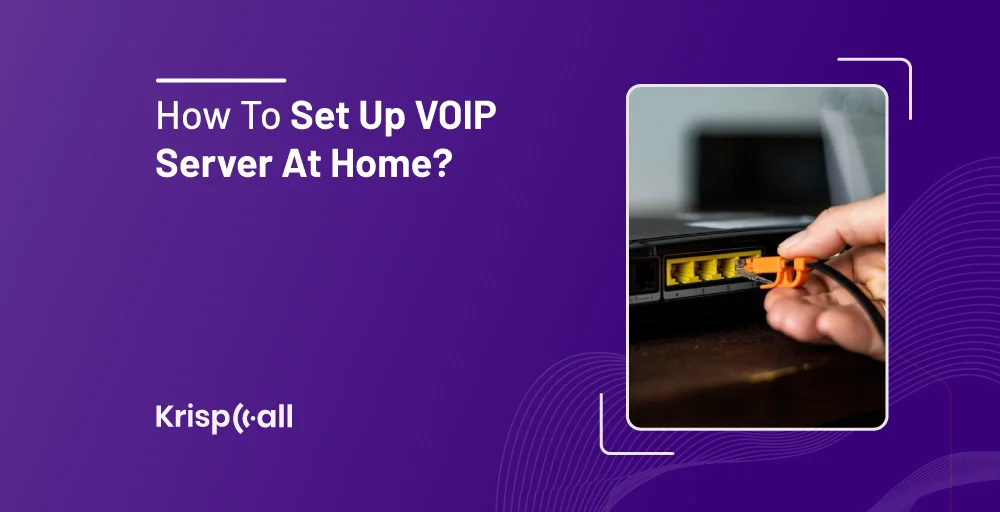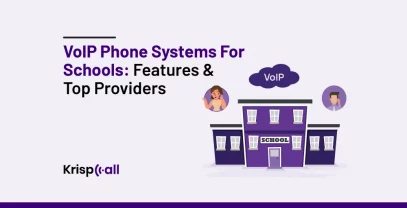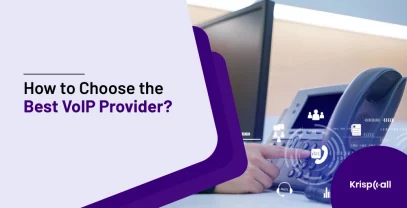Are you looking to set up a VoIP server at home? 👀
Given the limitations 😒 of traditional phone lines, such as limited features, less flexibility and mobility, and high setup and maintenance costs, many individuals are now shifting towards VoIP (Voice over Internet Protocol) solutions.
VoIP enables users to make and receive calls 📳 over the Internet from any device and any location. Setting up a VoIP server is easy and involves a simple process.
In this blog, we will be talking about the meaning of a VoIP server, the components of a VoIP server, and how to set up a voip server at home. Plus, we will consider some things to consider when starting with VoIP and its benefits.
So let’s get started.
🔑 KEY HIGHLIGHTS
- A VoIP server is responsible for transferring voice and multimedia communication over the internet.
- To set up a VoIP server at home, select the PBX server, have a reliable internet connection, choose appropriate hardware equipment, and get a SIP trunk.
- To get started with VoIP, you need an internet connection, a router, a VoIP phone or softphone, etc.
- Some things to consider when choosing a VoIP server provider include cost, features and customer support provided, call quality, etc.
What is a VoIP Server?
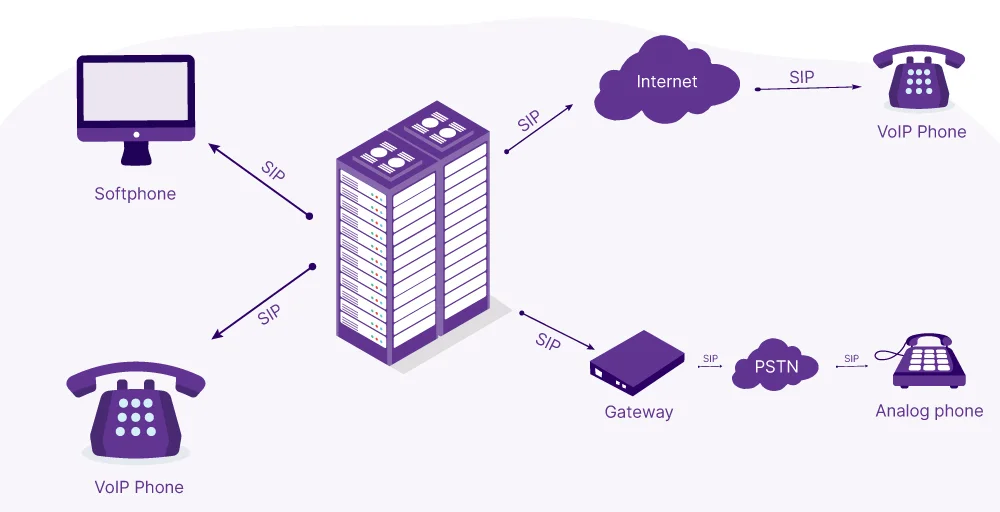
A VoIP server is a specialized computer system or software application responsible for transferring voice (calls) over the Internet. It lets people make HD-quality voice calls through computers, smartphones, and VoIP phones.
A VoIP server can be software or hardware that transmits real-time calls. It handles various aspects of call routing, signaling, and media processing and ensures good sound quality. Essentially, it keeps the whole VoIP phone system running smoothly.
How does Voice Over Internet Protocol Server work?
Voice over Internet Protocol server works by converting analog audio signals into digital signals and transferring them over a high-speed internet connection.
Here’s how the VoIP server works:
- Capture analog audio signal: The VoIP server first takes analog audio (your voice) when you speak on the VoIP phone.
- Convert analog audio signal into digital signal: Your captured voice is converted into a digital data packet using analog-to-digital conversion (ADC).
- Traveling over the internet: Then, data packets move to the VoIP provider’s server using an internet connection.
- Routing and codecs: VoIP providers find out where to send a call and compress data using codec software.
- Convert back to analog signal: Data packets are converted into analog signals using digital-to-analog (DAC) and sent to the receiver.
- Hearing to the receiver: Finally, the receiver can listen to your voice. Now, you are having a conversation on VoIP.
Components of VoIP Server
Here are some of the critical components of a VoIP server:
- Media server: This software application supports voice, video, and additional features such as voicemail, IVR, and voice mail to email.
- Application server: A computer service that stores and runs software applications, ensuring they work properly according to user demand.
- Signaling gateway controller: This is responsible for transferring the signaling messages between different networks, one format to another over IP.
- Softswitch: This is responsible for call routing, control, and signaling. After checking the dialed number, user availability, and network conditions, it directs incoming calls to the correct destination.
- SIP server: Session Initiation Protocol initiates, maintains, and terminates VoIP calls. It manages SIP signaling between endpoints, helping call setup, teardown, and other call control features.
- Media gateway: It interfaces between the VoIP network and the regular PSTN. It changes analog signals from a regular phone into digital information that can travel over the Internet and vice versa.
- Codec: It is used to compress and decompress audio data for efficient transmission over the internet. VoIP servers support various codecs to accommodate different network conditions and bandwidth requirements.
- Session Border Controller(SBC): They are deployed at the network border to secure and manage the call traffic, ensuring security and QoS.
Why is a VoIP Server necessary?
A VoIP server is necessary because it plays a pivotal role in facilitating voice and video communication over the Internet. It does vital functions such as storing, receiving, and distributing data.
Plus, it handles all the call routing, connections, and data flow, ensuring your calls go through. It’s also the brains behind those voicemail and call-forwarding features you love.
Without a VoIP server, the establishment of connections and facilitation of communication between users would be impossible.
Different Types of VoIP Servers
There are two types of VoIP servers. They are:
1. SIP Server
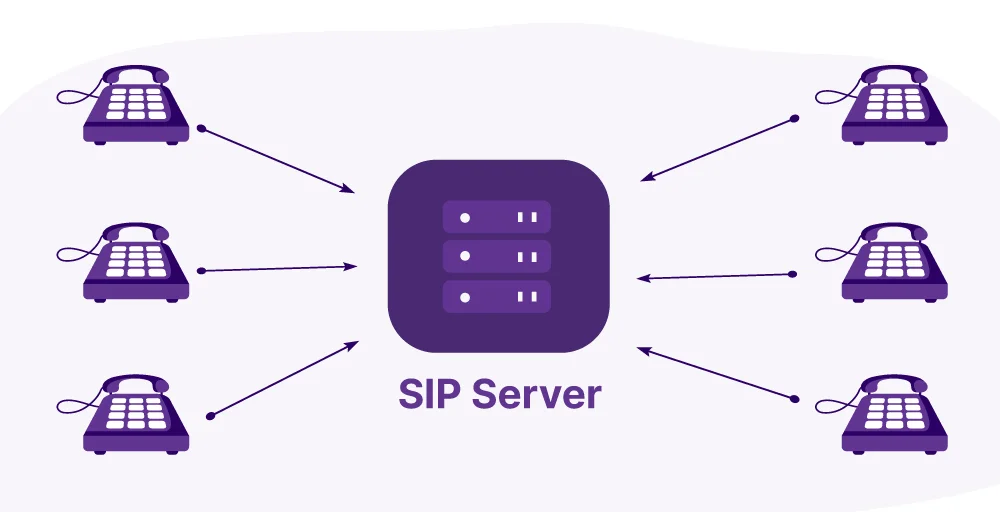
An SIP server is a type of VoIP server which manages and controls communication sessions between VoIP users. It is responsible for initiating, maintaining, and terminating real-time communication sessions that include voice, video, and instant messaging. It doesn’t actually handle the voice data but instead sets up the connection between endpoints.
2. PBX Server
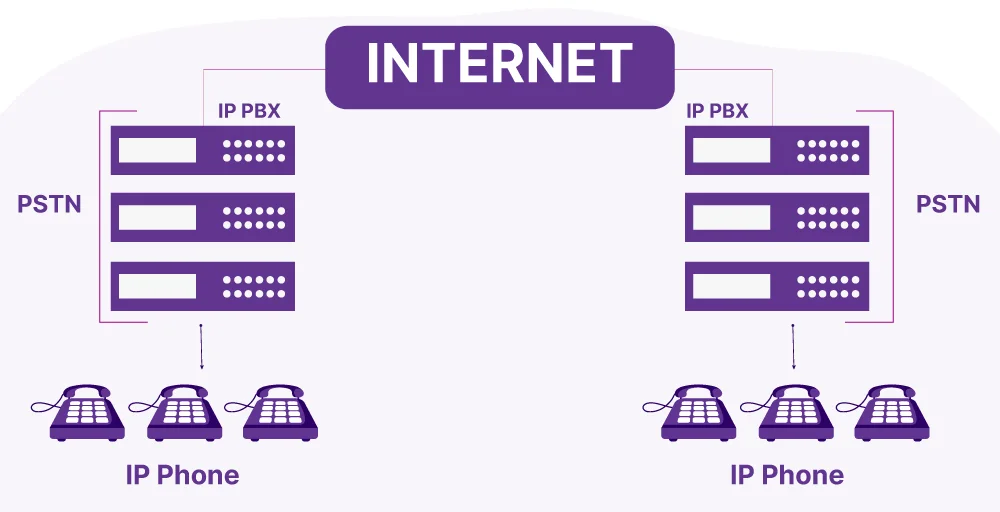
PBX servers are private telephone networks used within an organization to manager both inbound and outbound calls.
A PBX server routes calls within your organization, manages extensions for different users, and offers features like voicemail, auto attendants, and call forwarding. PBX servers can be on-premises or cloud-based and are often integrated with other business applications, such as CRM software.
What Things are Needed to Get Started with VoIP?
To get started with VoIP, you need the following things:
- An internet connection: You first need a reliable internet connection. VoIP completely relies on an internet connection to facilitate voice over the internet. You can’t make a call without an internet connection.
- A router: You don’t need to worry about the router if you are setting up VoIP at home, but it is essential to select the router if you are setting up for business purposes.
- VoIP phones or Softphones: You also need VoIP-compatible hardware to receive calls. These can be special VoIP phones designed for this purpose or even our smartphones and computers, which can run software apps that act like phones.
- Choose a reputable VoIP service provider: It is equally important to choose a reputable VoIP service provider like KrispCall, known for providing good service. It is recommended that you compare various service providers before you purchase their services. Make sure they offer all the features you are looking for.
How to Set up a VoIP Server at Home?
You can set up a VoIP Server at home by following these simple steps:
Step 1: Select the Server for PBX
PBX is required to share service with more than one person. You should select and set up the on-premise system that meets your needs. There are two ways to set up PBX: personal PCs or PBX applications.
- Personal PC Setup: You can use your own computer to set up VoIP. Most PBX systems work well with popular operating systems like Windows and Linux, saving you money without needing extra hardware.
- PBX Appliance Option: Consider a dedicated device like a mini-PC or Raspberry Pi for more extensive setups. These are ideal for home setups as they take minimal space, use less power, and produce less noise and heat.
Step 2: Ensure a Reliable Internet Connection
You need a strong internet connection with good bandwidth to receive and make calls. You can test the speed of your home’s internet connection to ensure it can support VoIP calls.
Various online tools, such as Ookla’s Speedtest.net or Fast.com, are available for conducting speed tests. Simply visit one of these websites and initiate the test. It will measure your download and upload speeds, latency, and jitter.
Step 3: Choose Appropriate VoIP Hardware
You also need to choose appropriate hardware equipment. Some crucial hardware equipment you will need to set up a home VoIP server includes a modem, router, headsets, and a VoIP phone.
VoIP phones come in two types: softphones and desk phones. A softphone is software you install on your computer, PC, or mobile phone, while a desk phone is a physical device you get from your provider.
Step 4: Get a SIP Trunk Provider
You should get an SIP trunk (Virtual Phone) to make and receive calls to local or international numbers over the Internet. It eliminates the need for physical phone lines to access the PSTN network, providing flexibility and scalability. With SIP trunking, you can easily adjust the number of lines you need in just a minute.
What are the Benefits of VoIP Server for Businesses?
VoIP servers in business are beneficial in many ways. Let’s discuss some of the benefits of VoIP servers :
- Cost-effective: VoIP servers are less costly than traditional phone lines. They eliminate the additional cost of wiring and equipment, and new line installation is free. International and long-distance call rates are also affordable.
- Advanced features: VoIP is not only for calls; it also has various latest and advanced features, such as caller ID, call transfer, voicemail, call barging, do-not-disturb mode, call analytics, and many more. These features help to handle a large volume of outgoing and incoming calls effectively.
- Better voice quality: VoIP servers provide better voice quality than traditional phone systems. To enjoy better-quality calls, make sure you have a stable and reliable internet connection.
- Integration with other business systems: VoIP servers allow easy integration with other business systems and applications, enhancing communication in business.
- Flexibility: With VoIP servers, you can communicate with your team members, customers, and others from anywhere in the world with stable internet-connected devices.
- Scalability: VoIP lets you increase or decrease the number of lines in a single click; you don’t need to buy additional equipment. It helps in organic business growth.
Best Practices for VoIP Server Management
To optimize the benefits of VoIP servers in business, best practices for VoIP server management can be followed in the following ways:
1. Understanding VoIP Server Monitoring
Understanding VoIP servers and monitoring them is crucial in business communication. Monitoring means checking the call quality and identifying issues before customers complain.
Various tools are available to monitor the VoIP server, such as call quality monitoring solutions, log analysis tools, network monitoring software, etc. Using all the tools, we can easily monitor and analyze the VoIP server for smooth customer service.
2. VoIP Server Management Strategies
Management strategies play a vital role in optimizing VoIP servers’ benefits. They include plans and policies to operate and monitor VoIP servers effectively. Businesses should use the best strategies to make smooth, quality calls, make a backup plan for any issues, ensure security, and minimize current and future problems that can hamper performance.
3. Overcoming VoIP Server Challenges
VoIP servers may face various challenges, such as network congestion, latency, firewall issues, etc. Businesses should overcome these challenges to achieve their goals without any interruptions.
They can use various techniques to overcome these challenges, such as optimizing network settings, prioritizing VoIP traffic, and using scalable server structures. Overcoming various challenges is essential for the smooth running of business.
4. Updated About Trends in VoIP Server Technology
VoIP server technology continues its evolution, and new advanced features are emerging. It includes integration with business tools, advanced security, scalability, uniform communication, better quality, etc.
Cloud-based VoIP solutions in business are expected to be more cost-effective, flexible, and scalable with cloud-based VoIP solution providers.
What are the Things to Consider When Choosing a VoIP Server Provider?
The following are the factors to consider when choosing a VoIP server provider:
- Quality: Quality is an essential factor when selecting VoIP service. Every incoming and outgoing call must be of high quality, so you should choose a provider that offers high-quality call services.
- Security: Security is a factor that can’t be ignored in any business. Before choosing a VoIP provider, you must ensure that it has followed reliable security protocols and that your data will be safe.
- Cost: A VoIP server system’s price differs depending on the providers and packages. Before installing a VoIP server in your business, you should estimate the total cost based on your budget. You should select the package based on your business scale and budget.
- Plan and features: Different server providers offer businesses various plans with multiple features. You should choose the server provider that provides you with appropriate features in a plan for your business, not one that provides you with more features but is not suitable for your business.
- Technical and customer support: When picking a VoIP provider, it’s crucial to consider their technical and customer support. The best providers are readily available to help customers with any technical issues.
- Unified communication: It means combining all communication channels into one place. You should check whether the VoIP server provider offers this feature in its package.
Conclusion
Setting up a VoIP server might seem complicated, but it can be worth it. With the right tools and resources, you can make a dependable and budget-friendly communication system for your business or personal needs.
You now know how to set up a voip phone server at home. So, what are you waiting for? 😃 Just go ahead and have the voip server set up. Trust us; you won’t regret setting up the IP phone server. You will enjoy many benefits like video calls, high-quality audio, and call management features (call recording, call monitoring, IVR, call forwarding, etc). Plus, you’ll save money on international calls and line rentals.

